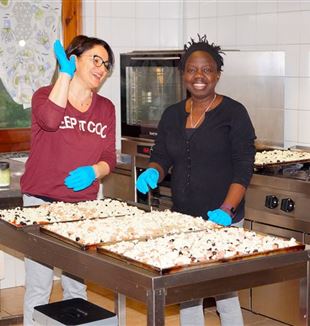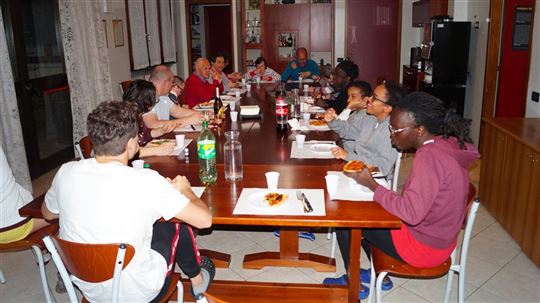
In quarantine, surprised by a hundredfold
The virus has also reached the “Tina Lesma” family home in Bresso, with ten guests with mild mental disabilities. Their initial fear and the difficulty in explaining what was happening. "But the struggles have not obscured the good we receive.”L. had attempted, twice, to climb through his ground-floor bedroom window to avoid isolation. On his second attempt, Luigi and Fabrizio decided to unscrew the handle. "Now it almost makes me laugh remembering her straddling the windowsill, but there was a period when we had great concern for our boys,” says Luigi Pellegrini, a math teacher. L. is 46 years old, deaf-mute, and is one of the ten "boys" between the ages of 30 and 65 with mild mental disabilities who live in the "Tina Lesma" family home in Bresso, in the province of Milan. "Some have been with us for almost twenty years," explains Fabrizio Minissale, who shares this experience with Luigi and their families. Founded in 1999, the family community is part of the Mirabilia Dei Social Cooperative, founded by Lorenzo Crosta, for families who wish to live out their vocation of marriage by welcoming people with disabilities.
In March, G., over sixty, fell ill: a high fever. They called Filippo Ciantia, a doctor, practically a father to Christine Ayoo, Luigi's wife, who had met him in Uganda whilst he was on mission. "Isolate him, get masks and gloves. You must minimize exposure to the virus," he warned them. And from that moment on, the ATS (Public Health Agency) rang everyday to enquire about the situation, asking them for the utmost caution, but saying that hospitalization was not necessary as his oxygen saturation levels were within the norm. "We knew that everything could degenerate at any moment. We tested his temperature 5/6 times a day and night," says Angelica Minniti, Fabrizio's wife. From that moment on, they put themselves in self-isolation. The situation was stable, but, after a week, three more “boys” got sick, without serious symptoms. They had to re-arrange the rooms in order to keep the infected people isolated. Sunday, the cook rang to say that she was not feeling well and Angelica too felt ill. Much of the burden of the house fell upon Ayoo. Every night, they recited the Rosary. "We did this before as well, it is one of the house rules. Only Mary could sustain us in that situation. Her and Providence," she says, focusing upon the image of Our Lady hanging in the living room with the iPad video. At the end of each decade, the invocation: "Jesus heal Maurice," who had been going with them to do charity work every Saturday for fifteen years, and who is hospitalized because of the virus. No one is forgotten.
Providence acts, the cook returned after two days and Angelica also recovered. Providence also acquired the face of the four general practitioners who follow the families and who call them every day. One of them showed up one Saturday with a pot of meat sauce and a savoury pie. "We have an incredible companionship around us. I think of Francesca, Giancarlo and other teachers with whom I share the experience of GS. And Leo, Massimo and Franco from the CL community in Bresso, who have always been close to us. I shared my concerns with them. Their friendship gives comfort even only through the phrase: "We pray for you,"” says Luigi. Twenty people between the ages of 6 and 65 sharing the same space. "It has been our grace. In the sense that we have never suffered isolation. We kept each other company by inventing something," Fabrizio says. Ping pong tournaments, improvised dances devised by the children involving the "boys". "But it is also a time for reflection," continues Angelica. "The trial, the struggles of these days have not obscured the good I receive from this experience. On the contrary. They testify the hundredfold." "For me, it becomes even clearer, almost paradoxically, that these are my people. It is my vocation", Luigi added.
The "boys" normally go to the social educational centre, managed by Fabrizio and Angelica, where they take part in various activities. This is now no longer possible, just as they cannot return to their families on weekends. Because of their psychiatric conditions, they do not have a full awareness of what this pandemic is. L. strongly feels the lack of physical contact, because a hug, a kiss, is his way of communicating. Every day someone asks, "Am I going home tomorrow?" "But never in an exasperated way," Fabrizio explains. "They look at the way we move and feel peaceful. Nobody freaked out. Even L., whom we try to console in some way, follows what you do. For us, the first miracle is that we are all here, the second is to be able to live in this situation well. This should not be taken for granted.”
In early April, P., 55 years-old with Downs syndrome, fell ill. His oxygen saturation level dropped and we needed to call the emergency services. No one, according to the safety regulations, could accompany him in the ambulance. He tested positive, but could go home for treatment. Fabrizio picked him up. In the car, P. said to him: "I was terrified! None of you were there!"
Read also – School learns to educate again
Housework, distance learning, games and prayer fill the day. "But this has been an opportunity for me to stop and look at the other," Ayoo says. "My husband, my children, the "boys", everyone. Look at them for the value they have." Every day, for those who want, there is Mass in streaming. Fabrizio is weighed down by not being able to physically receive Communion. Until "I realized that in washing the bathrooms, in sanitizing, in tidying up the rooms, I could meet Christ. His Body was there.”
M. has a serious mental retardation, when he fell ill he had to be hospitalized because he refused to eat, drink and take medicines. To every decade of the Rosary, this prayer was added: "Jesus, keep M. company".#Coronavirus